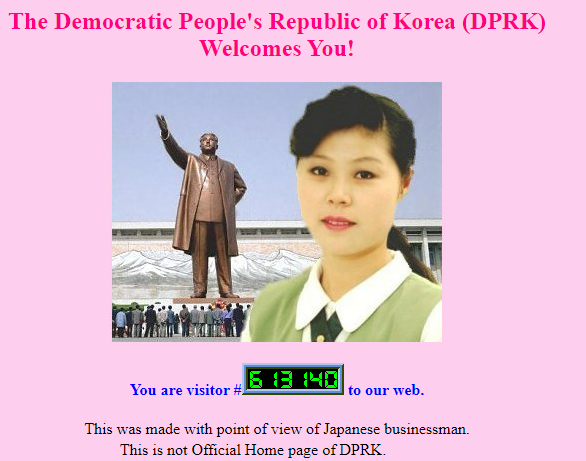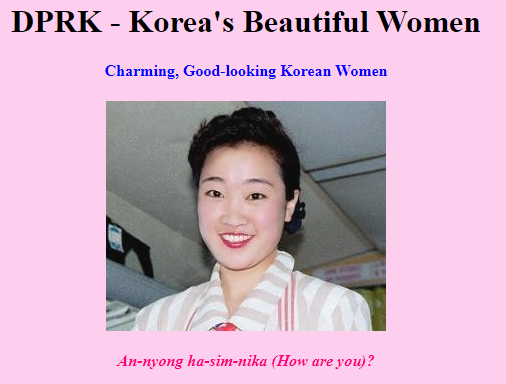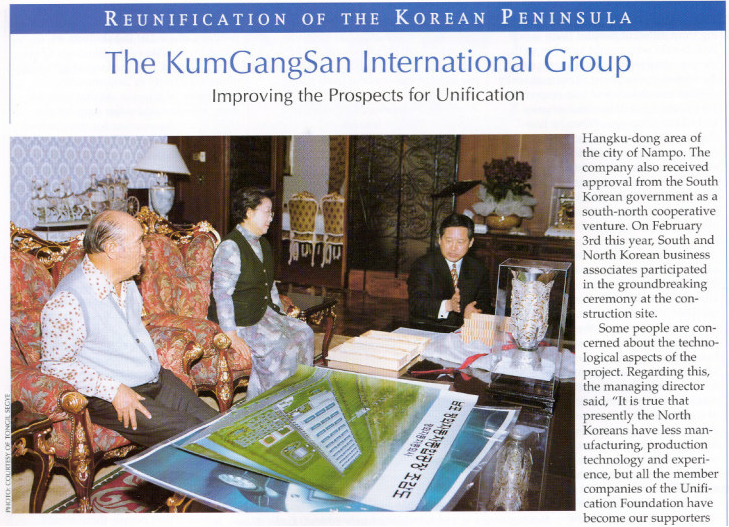Starting point of today's journey was this website. Last archived in 2009 right before the great shutdown of Geocities. The site only mentions "Anju, North Korea" and "closed". Travel back to 1999 and you will find a simple, yet informative little site. This site was once managed by a Mr. Kim (photo below), who desribes himself as "an old wanderer who wants to populate this virtual hometown with images, sounds and texts". He sees himself as a sort of temporary representative of the town of Anju in North Korea, until the local citizens pick up their mouses and keyboards and start populating the internet.

His website contains information and photo's about Anju, a city of roughly 240.000 citizens to the north of Pyongyang. Wikipedia will tell you that Anju is largely known for it's coal mining industry. There is also a large chemical complex and there is "at least one hotel that is open to foreigners". Back in the mid-nineties, Anju's people were suffering from a major flood. There is an eyewitness account written by Bernard Crisher, a former reporter for the NY Times dating back to 1996, describing what life was like back then. We read how rice rations were being reduced, but the quality of the grains still being good. The author tries to strike up a conversation with a random local in English, but is soon accompanied by his interpreter. The local claims to not know exactly what his rice ration is and claims not to be hungry.
Those who have some knowledge of North-Korean history, will know that the country suffered a catastrophic famine back in the mid-nineties. Supposedly leading to a staggering three million deaths. Just imagine living in this reality and then being hit by a flood, like the people in Anju did, and you get an idea of just how dire the situation must have been. The international community blamed the government's economic mismanagement as the cause of the famine. But also, this was only 5 years after the collapse of the USSR. With this important ally gone, NK was becoming increasingly isolated and could not rely on the support of their former ally. This was another contributing factor to the famine. In this post-cold war, "post-history" era, North-Korea became the weird kid on the block who held on communism.
It is not suprising then that there was a sense of hope in the words of Mr. Kim when he said he is waiting for the local Anju residents to claim their corner of the internet. Just five years after the collapse of the USSR, with a famine in the country, surely there was historic momentum for peace and perhaps even reunification of the Korean peninsula? This CNN article from 1997 is pretty interesting in that regard. Democratic Ohio politician Tony Hall visited North-Korea during the famine and criticised neighboring countries like Japan and South-Korea for withholding aid to pressure North-Korea into peace negotiations. The USA actually did provide some financial aid to NK, but it was not nearly enough to make a difference. Some articles from the late nineties do mention peace talks happening, but in hindsight we know that this did not lead to anything. In spite of their hunger, the North-Koreans did not revolt against their leaders.

Back to Mr. Kim's website. Browsing though his links page I found this fascinating website that was managed by a Japanese businessman who visited North-Korea numerous times in the nineties. This website has an English version, but the Japanese version is more expansive and you can get a pretty good impression of this writings using the site translation tools on your browser. The author, mister Tatsuo Sakai, has posted extensively on what life in North-Korea was like in the late nineties. He was an employee for "Kumgangsan International Group", which he described as a multinational company based in Pyongyang. On this page he explains that he is an engineer for communication satellites and one of his jobs was inspecting the satellite at the only hotel in NK where you can receive foreign TV channels. Mr. Sakai urges his readers to feel empathy for the suffering North-Koreans and provide them with aid. Sakai's official mission statement seems to have been to "remove the mutual misunderstanding and open our minds to communicate with each other."
Mr. Sakai's site contains a lot of information about North-Korean tourism, food, music, business and contains a rather perverted page of 'Korean Beauties' where he shares photos of beautiful women he ran into in North-Korea. He generalizes them as being "neat, clean, unpretentious, hard working and have healthy round plump faces", further comparing them to the great Buddha. On the Japanese version of his site he explains that he often got permission to photograph the women because in NK most people didn't have photo cameras. He promised to make them a print as well, allowing the women to have a colour photo of themselves. I have no idea if these women gave their consent for these images to be posted online though. Mr. Sakai later uncharacteristically also added a section of 'beautiful North-Korean men', but this page is only featured on the Japanese site.

Diving further into the site, you will see that Mr. Sakai is very positive about pretty much all aspects of North-Korea. He presents the idea of travelling to NK a bit too casually. He makes it sound like a trip to, oh well, any country that is not North-Korea. He is also suprisingly critical towards Japan in his articles. And while I do think that it's healthy to always try to see the viewpoints from both sides and I do believe that Western imperialism is a thing, I couldn't help but become a little suspicious of this website. Mr. Sakai adresses criticism he faced for his writings on his about page as being wrong, read the following excerpt:
There are several people who misunderstand the concept of this home page as a propaganda of DPRK. Please read each sentence more carefully. Due to the fact that I am currently having business with DPRK, there is a limit of expression. However, I am trying my best to include a certain degree of criticism and irony within this site.
"Paradise of the land," or "there is nothing for us to envy,"are the ideas that people in DPRK seriously believe in.
I was deeply shocked at this fact, and that is why I decided to let you all know this fact. People who did not understand this point, somewhat, seem to be so infant as far as language interpretation level. For your information, I have never said a sentence like "It is such a wonderful country," during my stay in DPRK. I know some Japanese political group would say this kind of sentence, though. I have personally had a lot of hard time while I am proceeding business with DPRK, being deceived and losing several million yens. I have a lot to complain about them even more than what those defectors from DPRK would have. But I would rather not articulate those. You know why? All I want is a brighter feature of North Koreans."
Googling his former employer "Kumgangsan International Group" will give you a number of hits. A 1998 article on Travelweekly mentions that the company was appointed to develop tourist facilities in the Mt. Kumgang region. This probably relates to the Mt. Kumgang Tourist Region established in 2002 to allow South-Korean citizens to travel to Mt. Kumgang in NK. The region got 1 million South-Korean visitors between 1998 and 2008 and was initially managed by South-Korean companies such as Kumgangsan and Hyundai. In 2008 a South-Korean woman was shot dead when she entered a military area. After this all South-Korean tourism to Mt. Kumgang was suspended.
Kumgangsan International Group has business connections with the South Korean Tongil Group, which was owned by the famous Unification Church cult leader Sun Myung Moon. Koryo Commercial Bank is described by 38North as the mother company of Kumgangsan International Group. Because Koryo is a company established by both North-Korean and American citiziens, we can conclude that Tatsuo Sakai's claim that he works for a multinational company based in Pyongyang is correct. I also found this interesting article published by the company in 2000 where they clearly express the reunification of the Korean peninsula as a goal.

Tatsuo Sakai's website was not a one of a kind project. According to this 2000 research article by Jung-Yul Cho from the University of Alabama, there was a 'wave' of Pro-NK websites during the mid-nineties. Cho argues that this wave was fueled by the writing of Bernard Crisher, who's eyewitness account I referred to in the beginning of this article. Crisher held an on-line campaign to help victims of North Korea's flood disaster. Tatsuo Sakai was, according to Cho, the first person to make a serious effort to create a NK centered site. Cho also states that Sakai's website was widely believed to be sponsored by the NK government.
All in all I am on the fence about Mr. Sakai's agenda for making this website. He claims to be an engineer who does not believe in the idea of Juche, but rather in the idea of making money. Yet, in most of his writings it's hard not to notice the overly positive attitude he has towards NK. He admits that NK is not as technologically advanced as Japan, but rather desribes it as the Japan from 40 years ago when he was a child. He also claims that he once got a temporary ban from visiting the country because he told a local that the level of development in NK is similar to that of the Chinese countryside, but better than places like Cambodia or Vietnam. One can wonder if these statements are true or if he is just trying to overcompensate for all the praise elsewhere on the site.
On the other hand, most people did not have the ability to visit NK as extensively as Mr. Sakai and I'm sure that we in the West are often presented an overly negative image of the country as well. I watched the Indigo Traveller's interesting series on North-Korea a few years ago and was suprised about how normal the country seemed to be and how much liberty Indigo Traveller was given to record the things he saw underway. In that regard Tatsuo Sakai is right when he emphasises the importance of mutual understanding and improving communication. I also feel like in the West we are often scrutinized as soon as we dare to say anything positive about countries like North-Korea, China or Russia. We'd rather vilify them than try to get a nuanced image. In 2000 Mr. Sakai was 46 years old, meaning he would be 70 years old now. I wonder where he is now and what he has to say about this site 24 years after the fact.
Both Mr. Kim and Mr. Sakai's websites are a looking glass into the past. Regardless of Tatsuo Sakai's agenda, his site is fascinating and bears historic relevance. The spirit around the two Koreas in the late nineties and early 2000s was one of hope. People in South-Korea, Japan and in the west hoped that with the collapse of the Soviet bloc, North-Korea would be next to open their borders. At the very least there were prospects for peaceful coexistence. The Kumgangsan Tourist Region was one of several initiatives to try to strengthen ties between the two Koreas in the early 2000s. There were also the Kaesong Industrial Region and the Dorasan train station connecting the two Korea's.
In january 2024 the Kumgangsan Tourist Region was officially closed. This is a telling sign of the current state of affairs on the peninsula. Peace is much further away now that it was in in 2002 and it seems impossible to even imagine a Korea that is one day unified again.